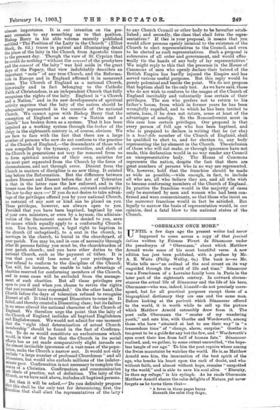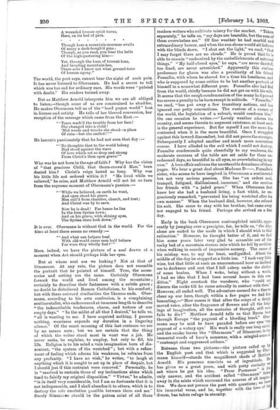" OBERAIANN 'ONCE MORE."•' -U NTIL a few days - ago .
the present writer had never happened to ccime across a copy 'of that journal intime written by , tienne Pivert de Senancour, under the . pseudonym of " Oherniann," about which Matthew Arnold* wrote some of his most beautiful . veise.. neiv. edition has just . been published, with , a preface. by Mr. A. E.. Waite' (Philip, Wellby, 6s.) . The . book. .s—so. Mr. Waite tells us—" an ordinal of the soul errant on HS way.
unguided through the world of life and time." SenancOur was a Frenchman of a Lorraine family born in. Paris in the later part of the eighteenth century. In outward circum- stances the actual life of Senancour and the life of his hero, Obermann7-who was, indeed, himself—do not precisely corre- spond, but for all practical purposes except those of a biographical . dictionary they are one and the same man. Before looking at. the portrait which Senancour offered to the world, it - is. worth while to call up the picture which Matthew Arnold ostensibly drew from it, The poet calls Obermattn the "master of my wandering youth,", a.nd,, sets him, with Goethe and Wordsworth, among those who have "attained- at last . to see their way" in " a tremendous time" of "change, alarm, -surprise." Goethe is too great to be a. guide for any but the few, and " Wordaworth's eyes avert their. ken from half of human fate." Senancour realised, and, we gather; to some extent unravelled, "the hope- less tangle of ourage." ,:To him the poet repairs where among the Swiss mountains he watches the world. He is, as Matthew . 'Arnold sees him, the incarnation of the best spirit of the 'age, who breaks his heart 'Upon the rack of doubt, and who tvithout faith, and- almost without hope, remains "unspotted by the world," and is able to save his soul alive. "Eternity, be thou my refuge," .is his epitaph: As he reads Obermann. Matthew Arnold shares the calm 'delights of Nature, yet never forgets as.he.turns them that—.., " A fever in these pages burns Beneath the calm they feign;
A wounded human spirit turns, Here, on its bed of pain.
000000 • • Though here a mountain-murmur swells Of many a dark-bough'd pine ; Though, as you read, you hear the bells Of the high-pasturing kine- Yet, through the hum of torrent lone, And brooding mountain-bee, There sobs I know not what ground-tone Of human agony."
The world, the poet says, cannot bear the sight of such pain. It has never listened to Obermann. He had a secret to tell which was too sad for ordinary ears. His words were "palsied with doubt." His readers turned away.
But as Matthew Arnold interprets him we are all obliged to listen,—though some of us are constrained to shudder. He makes Obermann tell us of the "hard pagan world" lost in license and satiety. He tells of her blessed conversion, her reception of the message which came from the East :—
"'Tears wash'd the trouble from her face ! She changed into a child !
'Mid weeds and wrecks she stood—a place Of ruin—but she smiled!"
He laments passionately that he had not seen that day :—
"No thoughts that to the world belong Had stood against the wave Of love which set so deep and strong
From Christ's then open grave."
Why was he not born in the age of faith ? Why has the vision of "that gracious Child, that thorn-crown'd Man," been
denied him ? Christ's reign lasted BO long. Why was his little life not ordered within it ? "He lived while we believed," he cries, and Matthew Arnold will not let us turn from the supreme moment of Obermann's passion:—
" 'While we believed, on earth he went, And open stood his grave. Men call'd from chamber, church, and tent;
And Christ was by to save.
Now he is dead ! Far hence he lies In the lorn Syrian town;
And on his grave, with shining eyes, The Syrian stars look down.' " It is over. Obermann is without God in the world. For the time at least there seems no remedy :—
" And what can helpers heal
With old-world cures men half believe For woes they wholly feel ?"
Here, indeed, we have the picture of a soul drawn at a moment when Art should perhaps hide her eyes.
But at whose soul are we looking ? Not at that of Senancour. At any rate, the picture does not resemble the portrait that he painted of himself. True, the acces- sories and setting are the same. Certainly Obermaim forsook the world and lived among the mountains ; certainly he describes their fastnesses with a subtle grace ; no doubt he disbelieved Roman Catholicism, to his comfort; but with these outward similarities the likeness ends. Ober- mann, according to his own confession, is a complaining sentimentalist, who endeavoured at immense length to describe "the indescribable tenderness, charm, and torture of our empty days." "In the midst of all that I desired," he tells us, "all is wanting to me. I have acquired nothing, I possess nothing, weariness expends my duration in a lingering silence." Of the exact meaning of this last sentence we are by no means sure ; but we are certain that the thing of which the writer stood most in want was a job. He never seeks, he explains, to employ, but only to fill, his life. Religion is to his mind a vain imagination born of dis- content, "the system of the wretched" ; but with a refine- ment of feeling which adorns his weakness, he refrains from any profanity. "I have no wish," he writes, "to laugh at
anything which it is sought to set up in place of despair, but I should jest if this restraint were removed." Personally, he
is "resolved to restrain those of my inclinations alone which tend to falsify my original disposition." "Virtue," be admits, "is in itself very considerable, but I am so fortunate that it is not indispensable, and I shall abandon it to others, which is to destroy the sole emulation possible between them and me." Surely Senancoar ahould be the patron saint of all those
modern writers who cultivate misery for the market. " Taken separately," he tells us, "my days are bearable, but the sum of them overwhelms me."- Of fine weather he had morbid and extraordinary horror, and when the sun shone would sit indoors with the blinds down. "I shut out the light," we read, "that I may forget there are no clouds." He is proud that he is able to remain "undeceived by the embellishments of external, things." "My half-closed eyes," he says, "are never dazzled,
too fixed, are never astonished." Apparently this curio
preference for gloom was also a peculiarity of his friend Fonsalbe, with whom he shared for a time his loneliness, and who is supposed by some critics to be but another portrait of himself in a somewhat different pose. Fonsalbe also had fled from the world, chiefly because he did not get on with his wife. It seems that the rough condemnation of the many had proved too severe a penalty to be born except in solitude. " Fousalbe," we read, "has put away a few transitory motions, and has ignored our petty conventions. The custom of a corner of the world, the legislation of a suburb, would condemn him." On one occasion he writes :—" Lovely weather adorns the country, and seems therein to augment existence, at least such is the general experience. But for myself I am the more dis- contented when it is the more beautiful. Once I struggled against this inward discomfort, but did not prove the stronger. Subsequently I adopted another and much more convenient course. I have alluded to the evil which I could not destroy. Fonsalbe condescends quite cheerfully to my weakness, the moderate excesses of the table are set aside for these un. redeemed days, so beautiful in all eyes, so overwhelming in my own." A love affair enlivens the unutterable dreariness of these pages. We hear a great deal about Madame D—, Fons2lbe's sister, who seems to have inspired in Obermann a sentimental but not very serious passion. She has "an ardent soul, tranquil, fatigued, disillusioned, immense," and she receives her friends with "a jaded grace." When Obermann first knew her she had a husband living, a fact which, he nu graciously remarked, "prevented his being wretched after his own manner." When the husband died, however, she refused his suit. She came to stay with her brother, but came away not engaged to his friend. Perhaps she arrived on a fine day.
Early in the book Obermann contemplated suicide, appa- rently by jumping over a precipice, for, he tells us, "the Alps alone are suited to the mode in which I should wish to find extinction." However, he thought better of it, and we find him some years later very glad to scramble out of the rocky bed of a mountain stream into which he fell by accident when walking in search of impressive scenery. The cause of his mishap was, to say the least, undignified. About the middle of the day he stopped at a little inn. "I took very little wine, but that little at such an unaccustomed hour so inclined me to darkness and rest that I fell asleep under the shelter of some bushes. When I woke, being without a watch, I had no idea that I had been several hours in this con. dition." Night overtook the wanderer, who "could not discern the rocks till he came actually in contact with them." However, all ended well. The adventure seemed for a time to cheer up our hero, though within a few pages we find him lamenting,—" How comes it that after the songs of a deeply moved voice, after the fragrance of flowers and all the long. ings of imagination, all the ecstasies of thought, still nuts fails to die?" Matthew Arnold tells us that Byron bore through Europe "the pageant of a bleeding heart." Ober- mann may be said to have paraded before our eyes the pageant of a watery eye.' His work is really one long snivel, and the reader leaves the " Obermann" of Senancour, in the immortal words of Lear's nonsense, with a mingled sense ef "contempt and suppressed asthma."
Between these two pictures—the picture called up by the English poet and that which is suggested by Ober' mann himself—stands the magnificent shade of Matthew Arnold. His presence convicts us of ingratitude. lie has given us a great poem, and with petty curiosity we ask where he got his idea. "From Parnassus " is bls only answer, and the accident called " Obermann" Ya.des. away in the mists which surround the sources of all iner2r. tion. We dare not pursue the poet with questions; we his immortal verse, and he, together with the hero of le 'dream, has taken refuge in eternity:







































 Previous page
Previous page